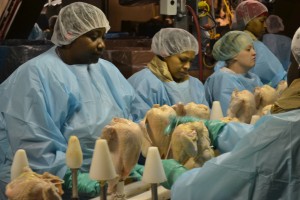The tragic poultry plant fire that killed 120 people in northeast China brought to light the horrors of unregulated and unsafe conditions and facilities for poultry workers. At the poultry plant, only one exit was unlocked as hundreds of workers stampeded for their lives in the dark. Locking emergency exit doors is a clear violation of Chinese laws and safety regulations – yet it still happened.
Initial reports say that the fire appeared to have started from an explosion caused by leaking ammonia, a chemical kept pressurized as part of the cooling system in meat processing plants. Ammonia is a dangerous chemical that is found in almost every poultry plant and proper safety precautions are imperative. Despite plant managers knowing how dangerous ammonia can be – there was still a leak that lead to disastrous results.
Many think that what happened in China is a problem that stems from poor worker safety laws in the Chinese system. Unfortunately, what happened in China is not a Chinese problem – it is a problem across the entire poultry industry. Violations of laws and safety regulations in poultry plants happen everywhere, including right here in the U.S.
In 1991, 25 workers were killed in a chicken processing plant in Hamlet, North Carolina. When a fire broke out at the plant, workers were trapped inside because seven of the building’s nine exit doors were locked or blocked. Even though locking and blocking exits are violations of safety laws and regulations, those violations were never reported. The plant had never been inspected by safety officials in the 11 years it had been open. Because safety standards were ignored, the fire turned into the worst industrial accident in state history.
The poultry industry’s history is marked by tragic plant accidents like the ones in China and North Carolina for a number of reasons. In the poultry industry, low safety standards and dangerous worksites are the norm. In an industry that is often based on aging infrastructure, dangerous chemical problems, and the under reporting of safety violations and accidents all contribute to perilous worksites and environments for workers.
Poultry workers with a union on the job are empowered to report these kinds of violations to avoid serious accidents or injuries. That’s why it’s so important for workers to have a union voice. UFCW routinely trains poultry and meatpacking workers on how to spot these and other health and safety violations in their plants. Union members work together to address health and safety hazards to keep workers safe.
Poultry companies need to be held accountable for the conditions in their plants. What happened to poultry workers in China can happen in any poultry plant. Because of the poultry industry’s low safety standards, all poultry workers from the U.S. and across the globe are at risk. Safety standards in the poultry industry must change in order to avoid more deaths and headlines like the most recent ones from China.
